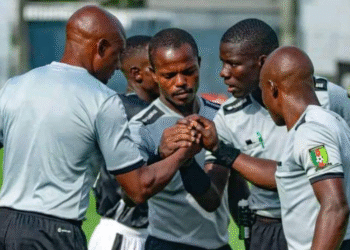 FUJIYOSHIDA, Japan – Sorcery, amulets, hexes and sacrificing livestock. Cameroon says it has finally outgrown all that. Now it possesses the strongest magic: talent. Still resorting to the use of witch doctors as recently as the African Nations Cup in 1998, Cameroon says it no longer needs help from the netherworld.
FUJIYOSHIDA, Japan – Sorcery, amulets, hexes and sacrificing livestock. Cameroon says it has finally outgrown all that. Now it possesses the strongest magic: talent. Still resorting to the use of witch doctors as recently as the African Nations Cup in 1998, Cameroon says it no longer needs help from the netherworld.
« Other teams do it all the time at matches. There are a lot of different beliefs in Africa, » said Cameroon striker Patrick Suffo, who plays for Sheffield United in England. « At the last African Nations Cup, one team buried a lamb.
« In the past, sure, we used sorcery and all that. But our team has won a lot of big matches and tournaments. We now have enough talent and when you have real talent you don’t need sorcery. »
Added team manager Andre Nguidjol: « There are sorcerers in the Cameroon delegation. They are the 11 magicians on the pitch.
« Certain countries resort to almost anything hoping to advance, but honestly, what we really need in Africa is not sorcery but better infrastructure. »
Though superstition is rampant in the sports world, the most devoted remain the African teams. In order to avoid a negative image of the African Nations Cup in Mali last February, Africa’s football confederation (CAF) refused to accredit so called « psychological guides » – otherwise known as sorcerers – who habitually follow the teams.
To get around the problem, countries such as like Nigeria and South Africa simply bought their sorcerers tickets so they could perform their magic from the stands.
In recent times, the Indomitable Lions undoubtedly have been influenced by the more western tendency to rely on science and statistics, with every one of its players plying his trade in Europe.
« You know, we all play in European teams and we’re away from all that, » Suffo said. « Some people believe in sorcery and luck, but personally, I think it’s more psychology than anything else. Sorcery is pure mental. »
But for all his rational thinking, Suffo also succumbs to his own irrational practices.
« Ever since I was 15, I’ve worn cycling shorts under my football shorts when I play a match, » Suffo admitted sheepishly.
Suffo insisted he wasn’t alone, claiming veteran defender Raymond Kalla always makes the sign of the cross as he steps onto the pitch, while teammate Lauren slaps his hand before every match.
Midfielder Marc-Vivien Foe wears lucky boots.
« One player wears the same underwear every match, but I won’t say who, » Suffo said.
The team also sings before every match, either popular Cameroon songs or ballads the players compose themselves.
« It’s very important for us to sing before games to prove we are together, » defender Lucien Mettomo said.
The team is also fearful of wearing yellow.
« Yellow is an unlucky color for the Cameroon team, » Suffo said. « There is superstition around the yellow jersey. We never have a good result in yellow. »
At the African Nations Cup in 1992, the canary-yellow Cameroonians lost 2-1 to Nigeria in the third-place match. In 1990, once again in yellow, they lost 4-0 to Russia in their last World Cup group game, and in 2000, again daring to wear yellow, the team lost 1-0 to Togo.
At this World Cup, wearing an unpopular white and black « away » jersey, Cameroon had a disappointing 1-1 tie with Ireland in its opening match. Then, donning its beloved green « home » jersey, the African side narrowly defeated Saudi Arabia to earn a crucial three points.
The team breathed a sigh of relief when it was told it would wear green for its final and decisive Group E match against three-time champions Germany on Tuesday.
Superstition in soccer is common in every country. Stepping onto the field with your right foot or wearing lucky socks. Not shaving. Carrying lucky charms. Or asking for help from your local sorcerer – anything is good heading into soccer’s quadrennial showcase.
Latin American players also are highly superstitious, though they tend to be more religious in nature.
Brazilian players often wear T-shirts with pictures of Jesus Christ or which read « Jesus gave me this goal » under their jerseys, while Mexicans pray to the Virgin Mary.
But Frenchman Laurent Blanc’s kiss to goalkeeper Fabien Barthez’s bald head before the start of every game in 1998 was proof even the most developed countries fall prey to superstition.









![Marc Brys snobe [encore] les Locaux](https://www.camfoot.com/wp-content/uploads/2025/03/IMG_4477-350x250.webp)

